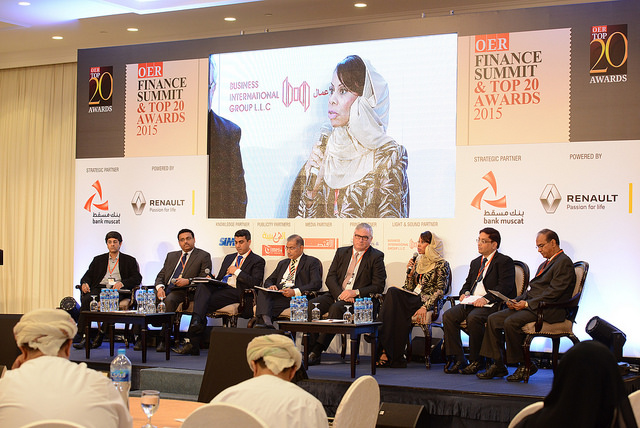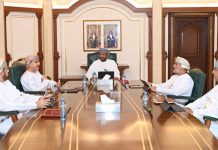OER Finance Summit and Top 20 awards held in Muscat on October 20 turned the spotlight on cost efficiency, tapping investment opportunities and diversifying the economy to offset the falling oil prices.
Organised by Oman Economic Review (OER), the Sultanate’s premium business magazine, the Finance Summit that was attended by Oman’s top CEO’s, CFO’s and financial leaders covered a gamut of topics that included managing business risk; negotiating financial uncertainty and striking a balance between short term objectives and long term sustainability against the backdrop of falling oil prices.
The crowning moment of the day was the presentation of the coveted OER Top 20 awards for companies for the financial year 2014. Sayyid Hamid bin Sultan Al Busaidi, Director General of Support & Services & In Charge of Oman Centre for Governance and Sustainability, Capital Market Authority, the guest of honour presented the awards in the presence of Sandeep Sehgal, Chief Executive, United Media Services. The OER Top 20 companies are the largest listed companies on the Muscat Securities Market (MSM).
OER Special Awards 2015 were also presented on the occasion. While Takaful Oman bagged the first award for its pioneering efforts in introducing sharia-compliant insurance products in Oman, OER’s Special Award for Excellence in Business and Marketing 2015 was presented to Oman Refreshment Company.
Bank Muscat, the flagship financial services provider in the Sultanate was the strategic partner, while Renault Oman by Suhail Bahwan Automobiles, was the associate partner. SIMPA Marketing Research was the Knowledge partner. Times of Oman, Al Shabiba and Alam Al Iktisad Wal Amal were the Media partners. Oman Printers & Stationers was the Print partner and Business International Group was the Light and Sound Partner.
Khalid Ansari, Partner-in-charge, KPMG Oman kick started the summit with an insightful presentation on ‘Challenges for businesses due to falling oil prices’, where he said that if the oil prices continued its downward dip, growth of net income and deposits would slow down, asset quality may deteriorate and government and other sectors spending will decline. The impact will be much more on SMEs, he said. Khalid said that there was no need for a knee-jerk reaction and banks have an important role in these challenging times.
Dr Charlotte Duke, partner, London Economics in her presentation on ‘Behavioural Economics – customer insights for an uncertain business environment,’ highlighted how customer preferences were evolving over the years and added that customers were driving competition across diverse sectors. Businesses should engage the customers to optimise sales.
Alfred Strolla, Managing partner, Deloitte Oman, in his presentation on “Maintaining leadership position’ said the Government of the Sultanate’s vision to diversify the economy showed signs of optimism. Additionally, the introduction of the railway project, the investment in petrochemicals through ORPIC and the recent award of the bitumen refinery project in Sohar are trends in the positive direction. The strategic and successful positioning of Duqm as a key economic hub of the future along with other free zones in Salalah and Sohar are expected to improve the investments and employment landscape.
Obviously, there are challenges, he said adding that it is not something that we should worry about at this stage in the short term. “We believe that the banks in Oman are and would continue to fund projects that are technically and financially feasible with a measurable degree of risks. It is also important to ensure that investments are backed by serious and well experienced strategic partners to improve the project’s risk profile and success.”
“Cost cutting forms a significant focus area for CFOs within the region. We believe that companies in the region would continue to implement cost reduction strategies in order to sustain growth over the short term and at the same time focus on strategic investments to improve growth in the medium to long term,” he said.
Dr Paula Ramada, Partner, London Economics in her presentation on “The new Competition Protection and Monopoly Prevention Law: some highlights and potential implications for Omani businesses,” said that purpose of the law is to encourage entrepreneurs and investment.
Sanjay Kawatra, Audit Partner, EY Oman, who spoke on the topic ‘There’s no reward without risk EY’s global governance, risk and compliance survey 2015’ said that financial, operational, regulatory, cybersecurity and reputational are the biggest risks for organisations as per a survey finding. Organisations need to consider risks in the context of their business. Each risk presents an opportunity, he said.
Rajeev Singh, Partner, Transaction Advisory Services, EY Oman moderated the panel discussion on ‘Managing Finance in an Uncertain Business Environment’ which highlighted the challenges for the financial sector. Panelists including T. Ganesh, CFO, Bank Muscat; Shahid Rasool, Chief Investment Officer, Ominvest; Jorgen Latte, CFO, Ooredoo; R K Mehta: Group CFO, MHD Group of Companies; Aftab Patel, CEO, Al Omaniya Financial Services; Haifa al Khaifi: Finance Director, Petroleum Development Oman and Avinash Patodia, Head – Finance, Jindal Shadeed Iron & Steel stressed the need to maintain ‘cautious optimism’ in the wake of declining oil prices.
Ganesh said banks in Oman have not felt the impact so far and they had enough liquidity. The Government spending in Oman, he said, had not come down significantly despite the lower oil prices. The Government is not hesitant to look at fiscal deficit now despite the number of years of fiscal surpluses in the past.
Shahid Rasool said that if oil prices continues its decline for the next 18 months, then the business confidence will be on the wane. But as far as Ominvest is concerned, we are investing in the downturn. The opportunity is right now, he said.
Jorgen Latte said that Ooredoo was investing its revenue to support the youth and the country.
Aftab Patel said that there was need to maintain cautious optimism in the wake of the declining oil prices and added that delays in payment and other challenges needs to addressed effectively.
R K Mehta said low oil prices has presented lot of challenges and opportunities as well. It is essential to look at economic diversification, he said.
Haifa al Khaifi said that despite the fall in oil prices, PDO had not delayed any projects. “We are executing projects that is adding value,” she said and added that PDO is staying on course with a robust growth programme.
Avinash Patodia said that economic diversification is the only way to ensure growth in the current scenario of lower oil prices.
Over 200 CEOs and senior executives from the top 50 listed companies on the Muscat Securities Market and business leaders from privately owned and joint stock companies attended the event. The Summit provided an opportunity to share best practices, and to gain insights on ways to address challenges and opportunities faced by businesses.
OER Finance Summit and Top 20 Awards 2015 calls for cost efficiency and economic diversification
To report this post you need to login first.






